In 2025, businesses are increasingly turning to software testing outsourcing solutions to enhance product reliability, reduce costs, and accelerate delivery. With the growing complexity of applications, quality assurance services have become an integral part of the software development services.
Outsourcing services enable companies to tap into global talent, utilize advanced tools such as Selenium testing software and JMeter load testing, and ensure comprehensive end-to-end software quality assurance.
Whether you’re a startup or an enterprise, partnering with a trusted software outsourcing company allows you to scale efficiently. Discover how software development outsourcing companies are reshaping QA with smarter, faster, and more reliable testing software services.

💡 What’s Next? Keep reading to discover:
🚀 Why outsourcing software testing is a smart move for modern businesses
🚀 The different engagement models used in QA outsourcing
🚀 How to select the right testing partner based on your business goals
🚀 Top tools and service providers dominating the QA outsourcing space in 2025
🚀 Future trends shaping outsourced QA and how to stay ahead of the curve
Introduction to Outsourced Software Testing in 2025
Outsourced software testing involves assigning testing tasks to external providers who specialize in QA services, such as manual testing, automation, and performance testing, using tools like Selenium, JMeter, and Postman.

The benefits of outsourcing include faster delivery, reduced internal workload, and access to expert testers. It helps companies improve software quality without increasing team size or investing in costly tools and infrastructure.
Why it matters:
- Helps companies release better software by identifying bugs early
- Saves time and effort for internal teams
- Gives access to experts in quality assurance testing
- Reduces the need to invest in testing tools like Selenium testing software or JMeter load testing software tools
- Supports faster delivery of software products
- Makes it easier to manage large testing needs during tight deadlines
- Improves overall software quality assurance without increasing team size
Engagement Models in QA Outsourcing
Engagement models in QA outsourcing define how companies collaborate with external partners to deliver software quality assurance testing services. The choice of model directly impacts communication, costs, control, and the overall effectiveness of quality assurance testing efforts.
1. Onshore Outsourcing
In this model, testing services are provided by teams within the same country.
- Ideal for businesses requiring tight coordination, shared time zones, and easier legal compliance
- Often chosen for high-security environments or industries with strict regulations.s
- Higher cost compared to offshore alternatives
2. Offshore Outsourcing
Testing is delivered from distant countries, often with cost advantages.
- Suitable for companies looking to optimize budgets and access large QA talent pools
- Enables 24/7 testing cycles across global time zones
- Requires strong communication processes and effective project oversight
3. Nearshore Outsourcing
QA teams are located in nearby countries, typically with minimal time zone differences.
- Offers a balance between cost-effectiveness and communication convenience
- Easier cultural alignment compared to offshore
- Useful for agile projects needing quicker feedback loops
4. Hybrid Outsourcing
Combines two or more models, for example, a local project manager working with an offshore QA team.
- Works well for long-term or complex projects that require both local interaction and global execution
- Balances cost with control
- Scales easily as project needs grow
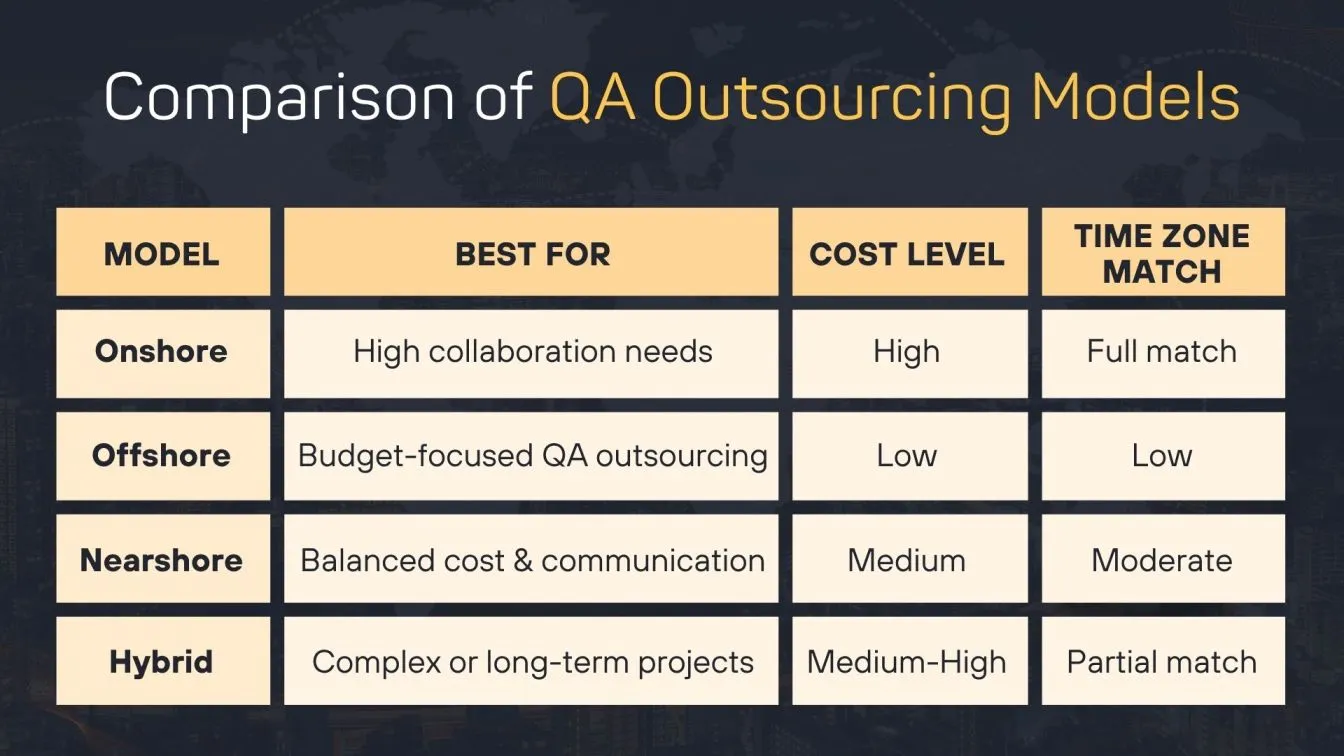
Strategic Considerations
When selecting a model, consider the following:
- Project Scope: Large or multi-phase projects may benefit from hybrid or offshore models.
- Team Collaboration Needs: If real-time interaction is critical, onshore or nearshore may be better suited.
- Budget Constraints: Offshore options typically provide lower-cost solutions without compromising access to tools like Selenium testing tool, JMeter, and other test automation software.
- Security and Compliance: Onshore models may better address strict regulatory requirements.
Top Outsourced Software Testing Tools in 2025
Outsourced software testing providers heavily rely on powerful tools to ensure high-quality deliverables, faster release cycles, and seamless integration with client development processes. These software testing tools enable external QA teams to conduct reliable functional, performance, and API testing while maintaining transparency and consistency across various projects.
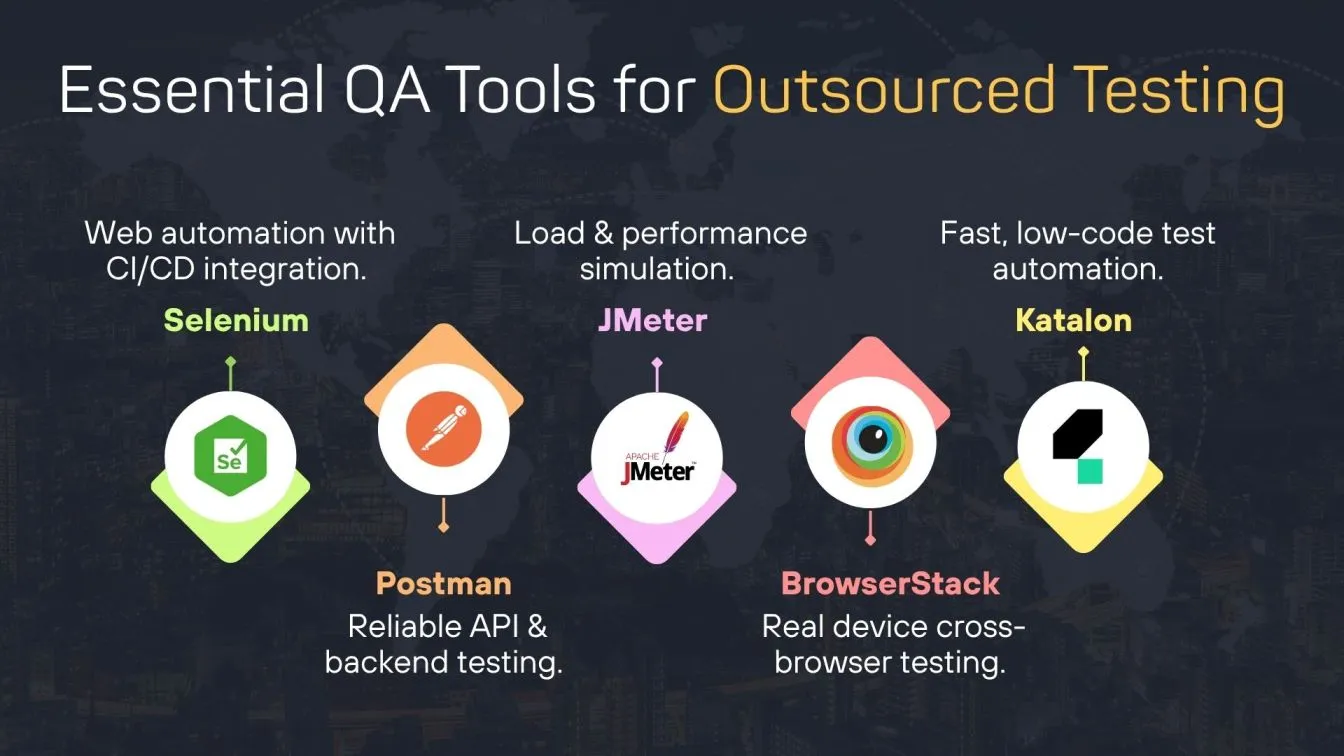
1. Selenium: Selenium is a popular open-source tool for automating web browser interactions, enabling end-to-end testing of web applications.
- How it's used in outsourcing: QA service providers support Selenium to create reusable automated test scripts across multiple browsers and platforms. It integrates well with CI/CD pipelines, making it ideal for delivering consistent regression testing results to clients working in agile environments.
- Best for: Web application automation, cross-browser testing, and continuous integration support.
2. Postman: Postman is an API testing platform used to build, test, and monitor RESTful services.
Example Script: Store Variables in Environment
baseUrl: https://api.example.com
URL:
{{baseUrl}}/loginlet res = pm.response.json();
pm.environment.set("token", res.token);
pm.test("Status code is 200", () => {
pm.response.to.have.status(200);
});- How it's used in outsourcing: Remote QA teams use Postman to test APIs independently from the frontend. They develop and maintain collections, automate API workflows, and verify service response reliability, crucial in microservices-based applications.
- Best for: Backend testing, validating third-party integrations, and ensuring service availability.
3. JMeter: JMeter is an open-source tool designed for load and performance testing, simulating multiple user requests to evaluate system behavior under stress.
- How it's used in outsourcing: Offshore QA teams use the JMeter plugin manager to benchmark application performance before client releases. It helps identify system bottlenecks and ensures stability under heavy load, especially for e-commerce or enterprise-grade platforms.
- Best for: Performance testing, stress/load testing, and tuning system scalability.
4. BrowserStack: BrowserStack provides cloud-based access to real devices and browsers for cross-platform testing.
- How it's used in outsourcing: QA vendors use BrowserStack to test applications on real mobile and desktop devices without the need for physical labs. It ensures consistency across environments and is useful for responsive and cross-browser testing.
- Best for: Real device testing, cross-browser compatibility, and visual validation.
5. Katalon Studio: Katalon Studio offers an all-in-one platform for web, mobile, desktop, and API automation tests.
- How it's used in outsourcing: External QA engineers use Katalon’s low-code interface and built-in templates to speed up automation creation. It’s especially helpful for projects with limited internal resources where clients expect quick ramp-ups and test coverage.
- Best for: Cross-platform automation, quick setup projects, and scalable test suites.
How to Choose the Right Testing Partner for Your Business
Selecting the right software testing partner is a strategic decision that impacts the quality, speed, and success of your digital products. A thoughtful approach ensures you collaborate with a vendor that understands your business goals and delivers measurable value.
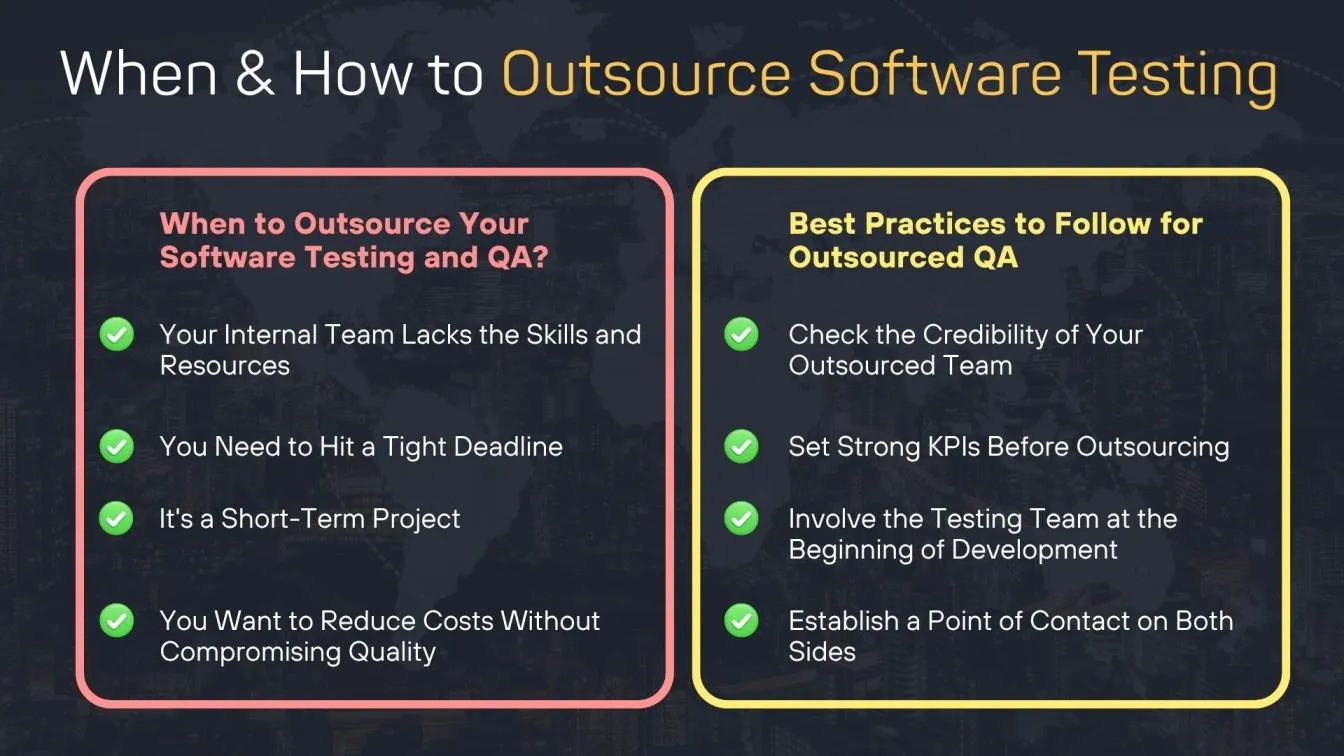
- Clearly define your testing needs:
Identify the specific services required, such as manual testing, test automation (e.g., Selenium), performance testing (e.g., JMeter), or compatibility testing, so you can shortlist partners who specialize in those areas. - Evaluate domain and tool expertise:
Choose a partner with experience in your industry and familiarity with your development tools and tech stack. Look for proven success through case studies, certifications, or client testimonials. - Assess communication and collaboration standards:
Opt for a vendor with transparent reporting, structured project management, and overlap in working hours if collaboration is critical, especially in agile environments. - Start with a short pilot project:
Conduct a brief trial phase to assess quality, defect detection rate, and responsiveness before committing to a full engagement. - Verify SLAs and regulatory readiness:
Ensure the vendor provides clear Service Level Agreements, respects data privacy, and complies with standards like GDPR or ISO, especially if your domain requires it.
Leading Outsourced Testing Service Providers in 2025
Outsourcing software testing has become a strategic advantage for businesses aiming to release high-quality digital products without the overhead of building in-house QA teams. From manual testing and automated testing to digital assurance and real-world crowd testing, today’s top providers offer robust services that help companies scale with confidence. Here’s a look at the leading outsourced QA providers in 2025, known for their innovative approaches, fast turnaround, and trusted testing expertise.
Frugal Testing - Smart & Scalable QA Outsourcing
Frugal Testing specializes in cost-effective, scalable outsourced software testing services. They cater to businesses of all sizes by providing flexible test execution models aligned with agile development cycles.
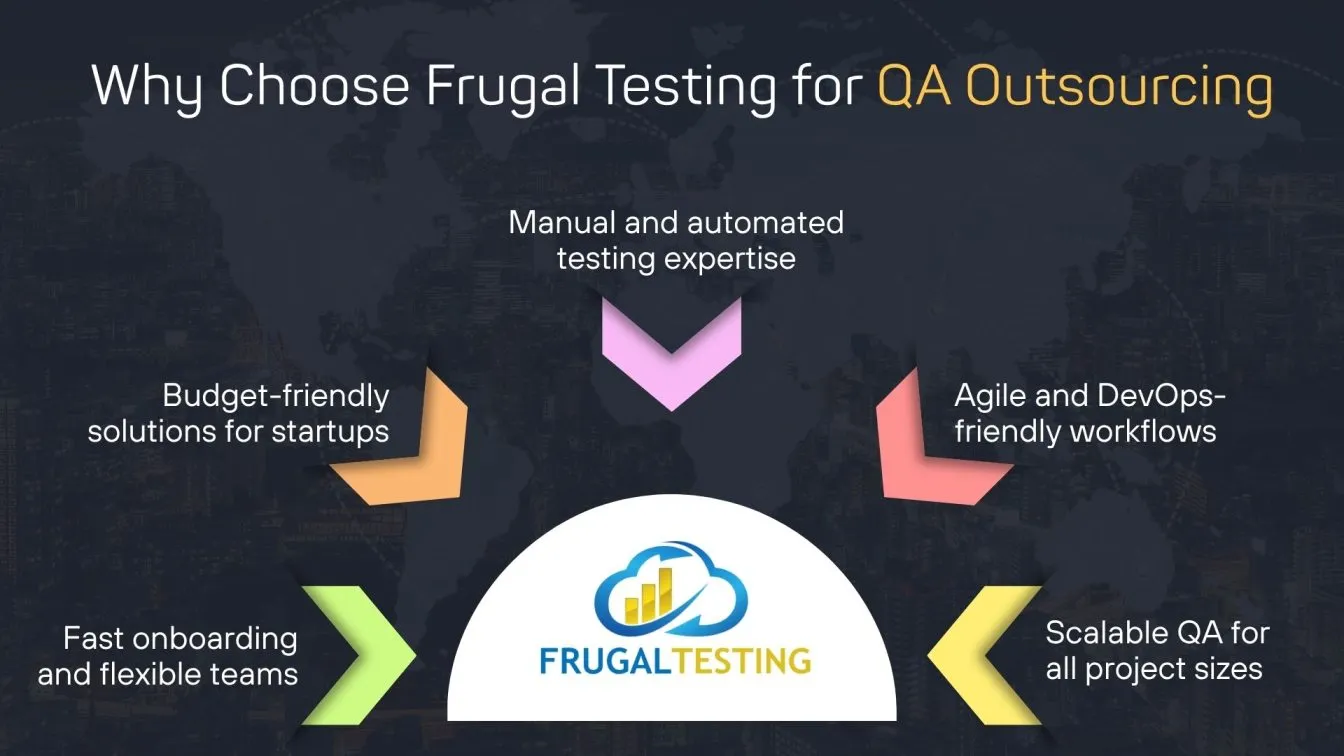
Core Testing Services:
- Manual testing to verify real-user functionality
- Automated testing using Selenium, JUnit, and TestNG
- API testing for integration and backend stability
- Performance and load testing
- Detailed test coverage mapping and regression testing
What Sets Them Apart:
Frugal Testing’s quick onboarding and adaptable QA teams make them an excellent choice for startups and growing enterprises. They combine functional testing expertise with cost-conscious solutions.
Ideal For: Agile product teams, SaaS companies, backend-heavy platforms
Testlio - Global QA Network with Real-User Validation
Testlio provides outsourced software testing through a global network of vetted testers. Their crowd testing model allows companies to simulate diverse environments and gather fast, reliable feedback.
Core Testing Services:
- Exploratory and regression testing
- Mobile app and usability testing
- Manual and automated testing
- Real-world bug reproduction
- API and localization testing
What Sets Them Apart:
Testlio’s strength lies in flexible, real-user crowd testing and the ability to plug directly into your CI/CD pipeline. Their QA teams provide test coverage across device types, locations, and languages.
Ideal For: Global mobile apps, real-time feedback needs, high user volume testing
Applause - Real-World Testing at Scale
Applause uses a crowd testing model to ensure that your applications work under real-world conditions. With thousands of testers across the globe, they offer comprehensive test coverage in dynamic environments.
Core Testing Services:
- Functional testing across devices and platforms
- API testing and integration validation
- Usability, accessibility, and localization testing
- Manual testing for regression and edge-case discovery
- Load and security testing
What Sets Them Apart:
Their global tester base ensures rapid turnaround and real-time reporting. They excel in regression testing and high-scale functional testing for web and mobile applications.
Ideal For: Consumer-facing apps, e-commerce platforms, large-scale deployments
Cigniti - Enterprise-Grade Digital Assurance
Cigniti is a global leader in QA outsourcing, delivering digital assurance across cloud, mobile, and enterprise platforms. They focus heavily on test automation solutions and compliance-based testing.
Core Testing Services:
- Manual testing and test case execution
- Automated testing integrated into DevOps
- ERP testing (SAP, Oracle, Salesforce)
- Functional and regression testing
- Security and API testing
What Sets Them Apart:
Cigniti stands out for its enterprise focus and its structured QA teams trained to handle compliance-heavy industries. They offer rich analytics and test coverage dashboards for transparency.
Ideal For: Enterprises with complex systems, regulated industries, cloud-native applications
Qualitest - AI-Driven QA & Intelligent Automation
Qualitest blends AI with traditional QA practices, offering outsourced testing solutions that enhance both quality and speed. Their services are designed to support digital innovation at scale.
Core Testing Services:
- Functional and performance testing
- AI-led test script generation and test coverage analysis
- IoT and connected device testing
- Cybersecurity and risk-based testing
- Automated regression and API testing
What Sets Them Apart:
Qualitest’s AI-driven platform identifies risk areas and optimizes test execution. They support fast-moving digital teams with intelligent automation and next-gen test strategies.
Ideal For: AI-first platforms, IoT products, companies undergoing digital transformation
Common Challenges in Outsourced QA and How to Overcome Them
While partnering with an outsourced QA or security testing service provider offers efficiency and scalability, it also introduces critical challenges that need careful handling. From cybersecurity gaps to data privacy concerns, here are five major challenges organizations face, and how to overcome them.
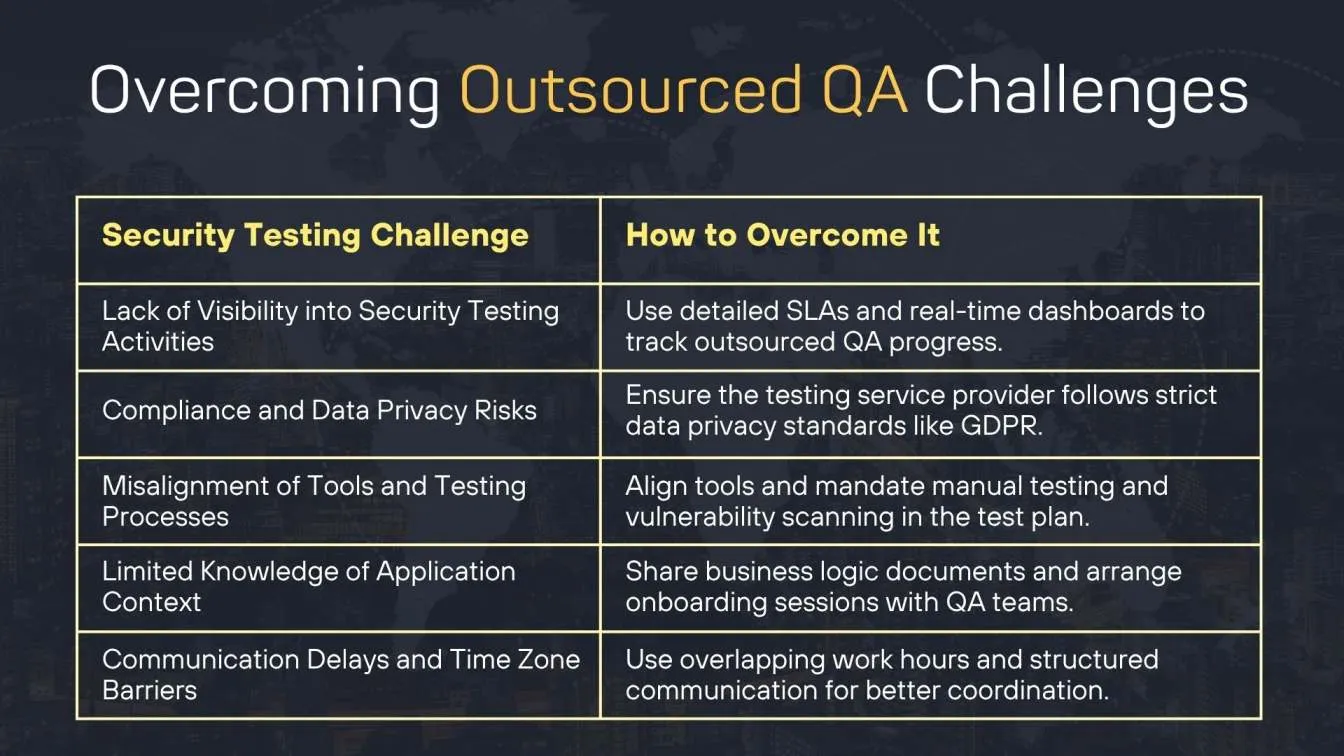
- Lack of Visibility into Security Testing Activities
In outsourced QA, clients often struggle to track how security testing is being executed. Limited transparency can affect test quality and leave vulnerabilities unchecked. - Compliance and Data Privacy Risks
Sharing sensitive user data with a third-party testing service provider may cause data privacy violations or non-compliance with industry standards such as GDPR or SOC 2. - Misalignment of Tools and Testing Processes
An outsourced QA team might use incompatible cybersecurity tools or skip critical steps like manual testing or proper vulnerability scanning, affecting overall test coverage. - Limited Knowledge of Application Context
External testers might lack an in-depth understanding of business logic or system flow, leading to incomplete or inefficient security test execution. - Communication Delays and Time Zone Barriers
Time zone differences between you and the security testing vendor can lead to poor collaboration, slow response times, and hinder the fixing of detected security issues.
Future Trends in QA Outsourcing Beyond 2025
As the demand for faster, more secure, and scalable software applications grows, the software outsourcing industry is evolving to meet new expectations. Emerging technologies, such as artificial intelligence (AI), hyperautomation, and crowdtesting, are transforming how QA and Testing are delivered across global teams and agile workflows.
- AI-Led Test Automation
Outsourced QA teams will increasingly utilize AI-powered testing strategies for test creation, bug detection, and predictive analysis, thereby reducing manual effort and enhancing accuracy over time. - Shift-Left Testing Approach
QA providers will emphasize early testing in the lifecycle, improving overall software systems quality and reducing the cost of late-stage fixes in custom outsource software development.

- Stronger Focus on Security & Compliance
With rising threats, data security, static code analysis, and regulatory compliance will become core elements of outsourced QA, especially in the United States. - Expansion of Crowdsourced Testing
Crowdsourced testing will offer real-world validation across devices, networks, and geographies, improving user experience and customer experience across sectors like fintech solutions and cloud solutions.
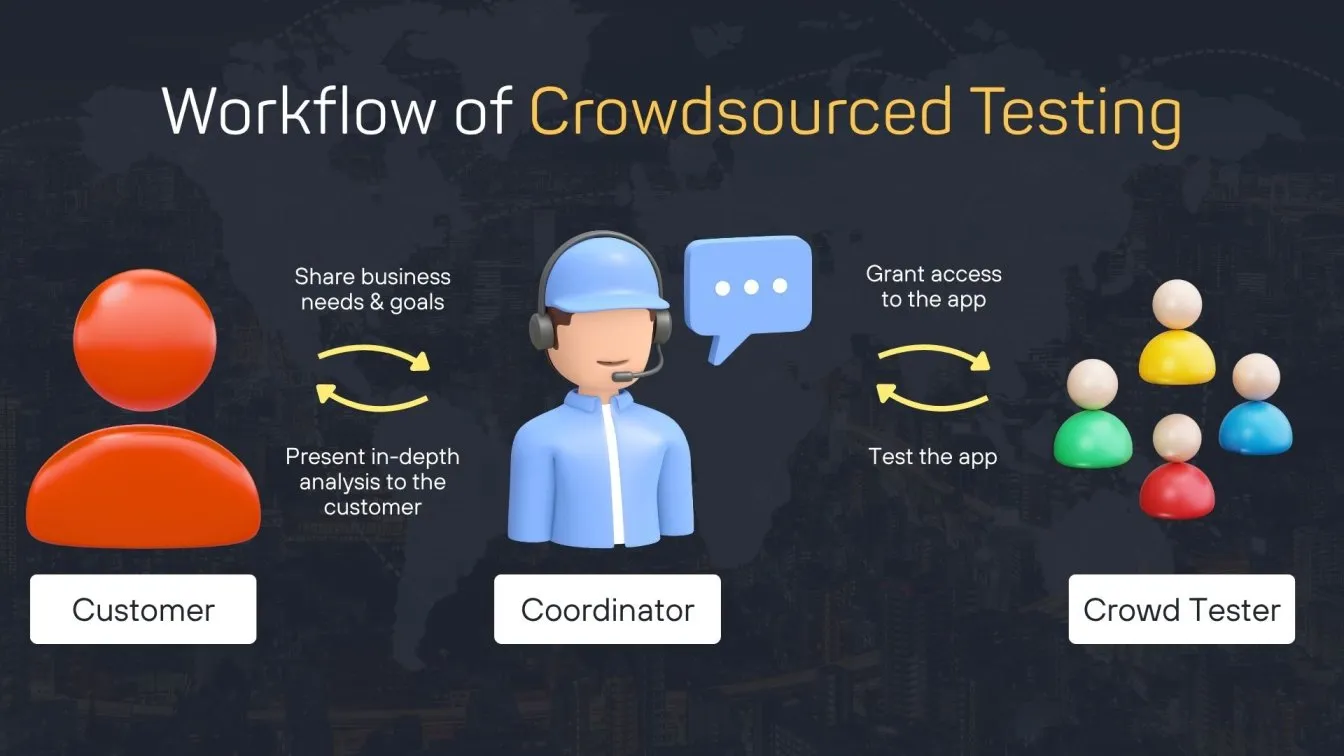
- QA Hyperautomation Using AI & RPA
AI, RPA, and business intelligence tools will drive hyperautomation, automating full test environments and reporting cycles to increase QA speed and efficiency.
Conclusion: Scaling with the Right QA Partner
Partnering with the right QA outsourcing provider ensures scalable growth and consistent software quality. A capable partner delivers specialized QA services, supports business intelligence, and adapts to changing needs with speed. The use of artificial intelligence improves automation, while a stable test environment boosts reliability and efficiency.
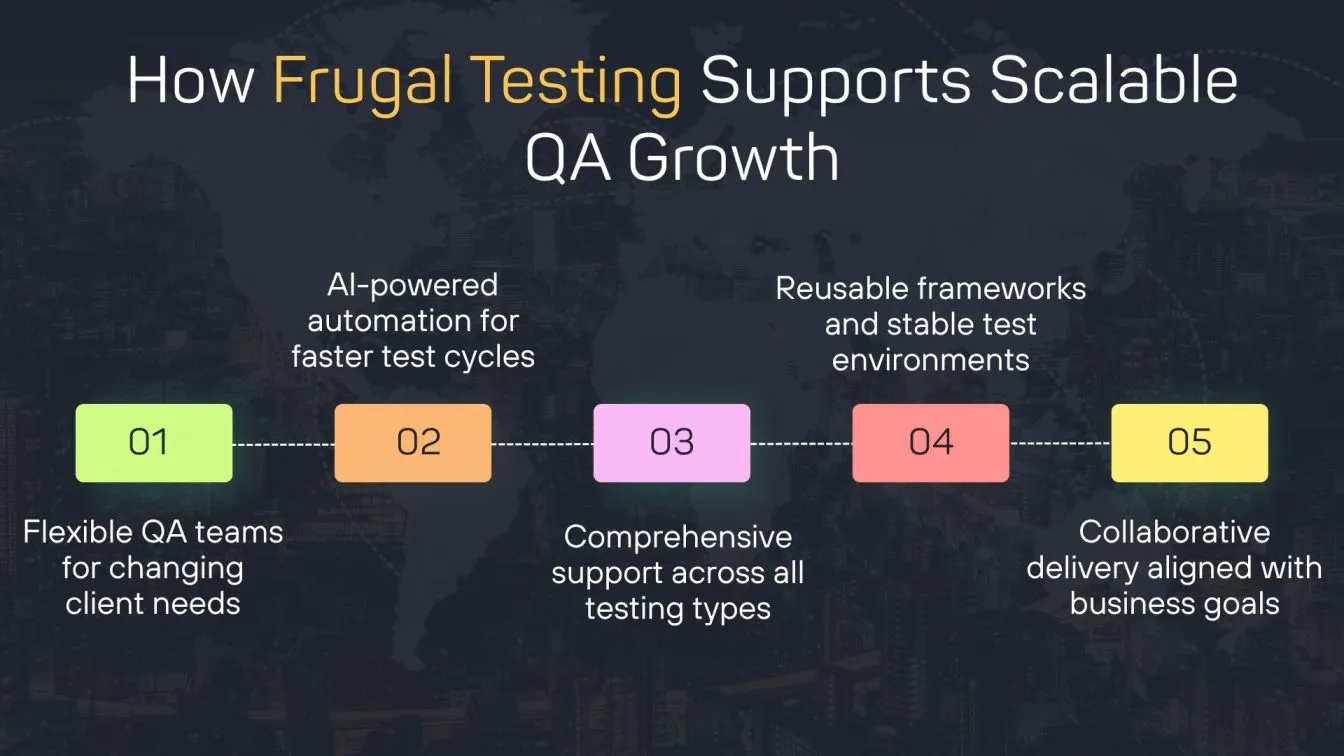
Focusing on user experience and strong Customer Service, a future-ready QA partner helps detect issues early, reduce defects, and meet market demands faster. This collaboration leads to secure, high-performing software development, better decision-making, and long-term success in today’s competitive digital ecosystem.
Frugal Testing is a leading SaaS application testing company known for its AI-driven test automation services. Among the services offered by Frugal Testing are cloud-based test automation services that help businesses improve testing efficiency, ensure software reliability, and achieve cost-effective, high-quality product delivery.
People Also Ask
👉What is ITSM testing?
ITSM (IT Service Management) testing ensures service management tools and workflows function as intended, focusing on incident, change, and problem management processes.
👉Is Playwright better than Selenium?
Playwright offers faster execution, modern architecture, and better support for multiple browsers, while Selenium is more established with broader community support.
👉Which test scripting platform is the best?
It depends on your needs, Selenium for flexibility, Playwright for modern web apps, and Cypress for front-end unit and integration testing.
👉How do QA providers handle cross-platform testing?
They use cloud-based device farms (like BrowserStack or Sauce Labs) to test across various browsers, OS, and devices for broader coverage.
👉How do providers handle test data security?
Leading vendors implement encryption, data masking, and secure access protocols to protect sensitive test data and comply with regulations like GDPR and HIPAA.




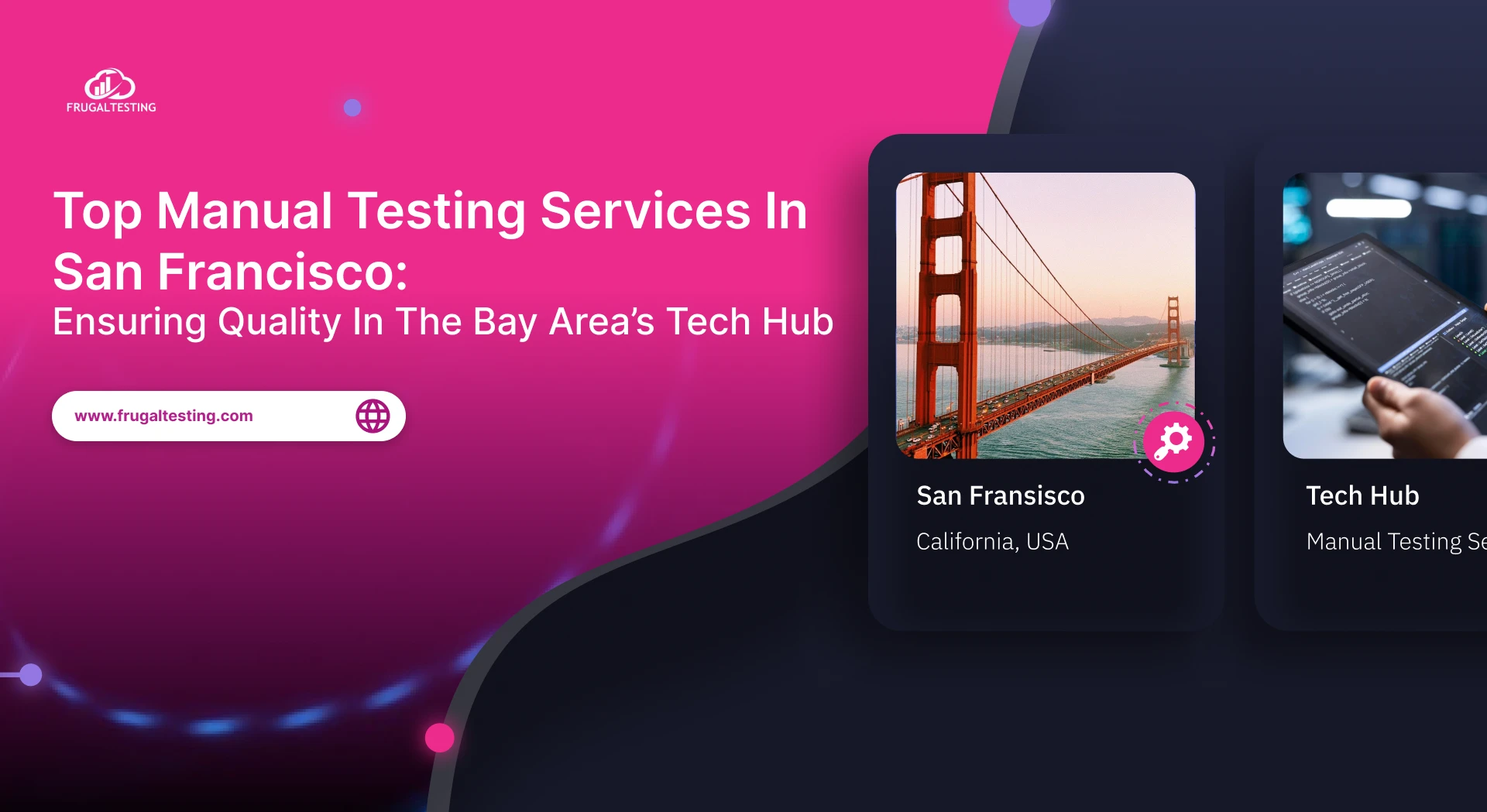
%201.webp)

